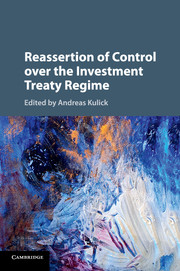Book contents
- Frontmatter
- Contents
- List of Contributors
- Preface
- PART I Introduction, Theory and Domestic Law Approaches
- PART II Procedural Aspects and Avenues of Reassertion
- PART III Substantive Aspects and Avenues of Reassertion
- 7 Masters of Puppets? Reassertion of Control through Joint Investment Treaty Interpretation
- 8 Systemic Integration: An Instrument for Reasserting the State's Control in Investment Arbitration?
- 9 Reasserting Control through Withdrawal from Investment Agreements: What Role for the Law of Treaties?
- 10 Legitimate Regulatory Interests: Case Law and Developments in IIA Practice
- 11 State Controls over Available Remedies in Investor-State Arbitration
- PART IV Reassertion of Control: Policy and Trends
- Index
10 - Legitimate Regulatory Interests: Case Law and Developments in IIA Practice
from PART III - Substantive Aspects and Avenues of Reassertion
Published online by Cambridge University Press: 12 January 2017
- Frontmatter
- Contents
- List of Contributors
- Preface
- PART I Introduction, Theory and Domestic Law Approaches
- PART II Procedural Aspects and Avenues of Reassertion
- PART III Substantive Aspects and Avenues of Reassertion
- 7 Masters of Puppets? Reassertion of Control through Joint Investment Treaty Interpretation
- 8 Systemic Integration: An Instrument for Reasserting the State's Control in Investment Arbitration?
- 9 Reasserting Control through Withdrawal from Investment Agreements: What Role for the Law of Treaties?
- 10 Legitimate Regulatory Interests: Case Law and Developments in IIA Practice
- 11 State Controls over Available Remedies in Investor-State Arbitration
- PART IV Reassertion of Control: Policy and Trends
- Index
Summary
A. Introduction
In response to the global financial crisis, governments around the world took unprecedented measures to avert the collapse of the global economic system. The scale and extent of this State-led intervention in the private sector, using billions of dollars of taxpayers’ money, forced a re-think of prevailing economic orthodoxy in a world of freely moving capital. This new reality presents challenges for investor-State dispute settlement, particularly where international investment law is underdeveloped or where the relationship between international law and international community policy is unclear. Take the 2012 Greek government bond exchange, the largest sovereign debt restructuring in history. It was a condition precedent to Greece receiving a €130 billion bail-out from the Eurozone Member States that private holders of Greek debt accept a 53.5 per cent haircut on the value of their bonds. The restructuring followed international best practice, using collective-action clauses to prevent ‘holdout’ bondholders from refusing to participate in the exchange and suing the State in domestic courts for full repayment under the bond contract. Following this multilateral effort driven by the Eurozone, the European Central Bank and the International Monetary Fund to reduce Greece's debt burden to sustainable levels, holders of restructured bonds commenced investment treaty arbitrations against Greece, arguing that they are entitled to compensation for the haircut under international law.
It is reasonable to expect that such real-world events will have implications for the development of international investment law, particularly as regards host States’ ‘legitimate regulatory interests’, a concept introduced but not defined by the tribunal in Saluka v. Czech Republic. Indeed, the altered global political economy since 2008 is reflected in the current focus on the right of States parties to international investment agreements (IIAs) to enact regulatory measures for the general welfare without incurring liability to foreign investors. This is now widely described as the State's ‘right to regulate’.
Mindful of this recent history, the purpose of this chapter is to survey how Contracting Parties to IIAs are reasserting their right to regulate in investment arbitration proceedings and in the drafting of their IIAs. This trend precedes the global financial crisis. In 2004, Canada and the United States both substantially reformulated their model bilateral investment treaties (BITs) to reflect concerns that some tribunals had interpreted IIAs too much in favour of investor rights at the expense of host States’ regulatory sovereignty.
- Type
- Chapter
- Information
- Reassertion of Control over the Investment Treaty Regime , pp. 230 - 258Publisher: Cambridge University PressPrint publication year: 2016
- 1
- Cited by



